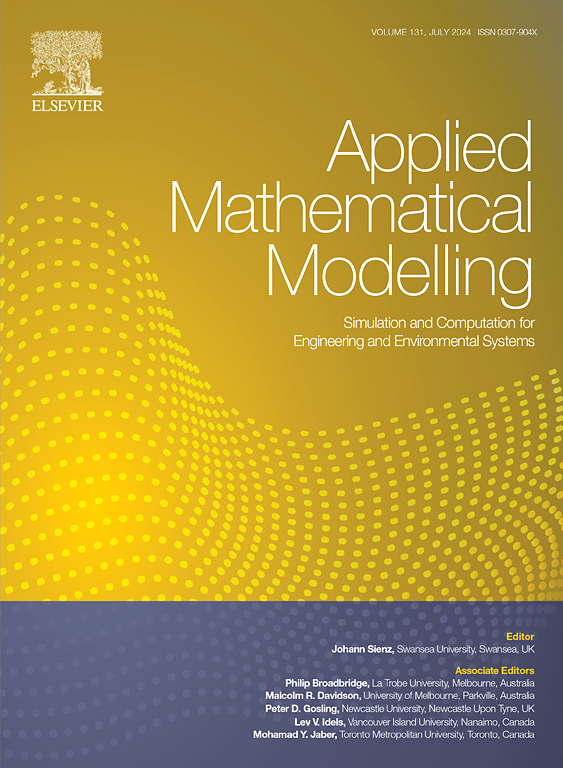具有无穷小距离比刚性的多智能体系统的形状镇定与群集控制
IF 4.4
2区 工程技术
Q1 ENGINEERING, MULTIDISCIPLINARY
引用次数: 0
摘要
在有限传感器测量约束下的多智能体系统稳定编队的挑战下,本文研究了一类分布式编队控制问题,其中每个智能体仅依赖其机载传感信息,而无法访问全局信息。为了解决这一问题,基于无限小距离比刚度理论,设计了一种新的分布式地层控制方法。该方法仅依赖于距离比和方向信息,这些信息可以从局部传感器测量中获得,即使在位置、位移和对准轴承信息无法测量的情况下也能实现形状稳定。这使得整个地层系统保持稳定,其特点是局部指数收敛,同时保持平移、旋转和缩放的自由。此外,引入了签名框架的概念,该概念提供了避免不期望平衡点和实现目标形状的初始条件。另一个重要贡献是,本文证明了二维空间中的三角形地层和三维空间中的四面体地层可以收敛到理想的地层,并且几乎具有全局指数稳定性。最后,通过仿真算例和物理实验验证了所提编队控制器的有效性。本文章由计算机程序翻译,如有差异,请以英文原文为准。
Shape stabilization and flocking control for multi-agent systems with infinitesimal ratio-of-distance rigidity
Driven by the challenge of stabilizing formations in multi-agent systems under constraints of limited sensor measurements, this paper investigates a class of distributed formation control problems where each agent relies solely on its onboard sensing information, without access to global information. To address this, a novel distributed formation control approach is designed based on the theory of infinitesimal ratio-of-distance rigidity. This approach relies solely on ratio-of-distance and direction information, which can be derived from local sensor measurements, and achieves shape stabilization even when position, displacement, and aligned bearing information are unmeasurable. This allows the entire formation system to achieve stability, characterized by local exponential convergence while maintaining freedoms of translation, rotation, and scaling. Additionally, the concept of signed frameworks is introduced, which provides initial conditions that can avoid undesired equilibrium points and realize target shapes. As another significant contribution, this paper proves that triangular formations in 2D space and tetrahedral formations in 3D space can converge to the desired formation with almost global exponential stability. Finally, simulation examples and physical experiments are presented to validate the effectiveness of the proposed formation controller.
求助全文
通过发布文献求助,成功后即可免费获取论文全文。
去求助
来源期刊

Applied Mathematical Modelling
数学-工程:综合
CiteScore
9.80
自引率
8.00%
发文量
508
审稿时长
43 days
期刊介绍:
Applied Mathematical Modelling focuses on research related to the mathematical modelling of engineering and environmental processes, manufacturing, and industrial systems. A significant emerging area of research activity involves multiphysics processes, and contributions in this area are particularly encouraged.
This influential publication covers a wide spectrum of subjects including heat transfer, fluid mechanics, CFD, and transport phenomena; solid mechanics and mechanics of metals; electromagnets and MHD; reliability modelling and system optimization; finite volume, finite element, and boundary element procedures; modelling of inventory, industrial, manufacturing and logistics systems for viable decision making; civil engineering systems and structures; mineral and energy resources; relevant software engineering issues associated with CAD and CAE; and materials and metallurgical engineering.
Applied Mathematical Modelling is primarily interested in papers developing increased insights into real-world problems through novel mathematical modelling, novel applications or a combination of these. Papers employing existing numerical techniques must demonstrate sufficient novelty in the solution of practical problems. Papers on fuzzy logic in decision-making or purely financial mathematics are normally not considered. Research on fractional differential equations, bifurcation, and numerical methods needs to include practical examples. Population dynamics must solve realistic scenarios. Papers in the area of logistics and business modelling should demonstrate meaningful managerial insight. Submissions with no real-world application will not be considered.
 求助内容:
求助内容: 应助结果提醒方式:
应助结果提醒方式:


